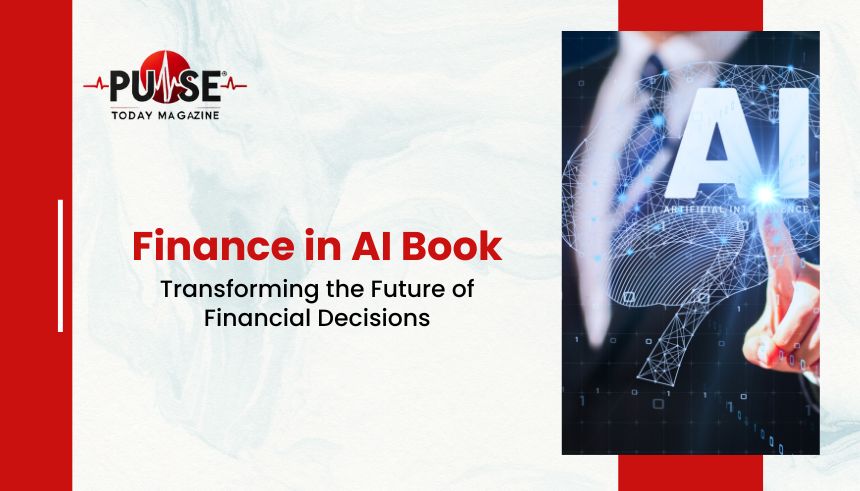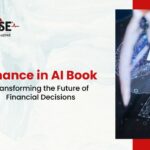Artificial intelligence (AI) is transforming businesses globally, and the banking sector is no exception. Algorithmic trading and fraud detection are just two of the ways artificial intelligence is transforming financial decision-making. The Finance in AI book offers a thorough explanation of how artificial intelligence has been used in contemporary financial systems.
It shows how AI boosts productivity, accuracy, and profitability in the financial sector. This blog explores the advantages, applications, and future of artificial intelligence (AI) in finance.

Role of AI in Finance
Innovative breakthroughs have been produced by the use of AI in finance. To enable more accurate predictive analysis, financial institutions are now using AI to process large datasets. Here are some ways AI in finance is changing the finance industry:
1. Algorithmic Trading
By examining market patterns and placing transactions at the best times, AI algorithms are completely changing the trading industry. These AI-powered systems optimize investment strategies by adjusting to real-time data, reducing risks and increasing returns.
Artificial intelligence (AI) greatly helps hedge funds and institutional investors by automating trading decisions and lowering human error. The Finance in AI Book looks into how such algorithms generate dynamic data-driven strategies.
2. Fraud Detection and Prevention
Fighting financial fraud is being led by AI in finance. Artificial intelligence (AI)-driven systems track transactions in real-time and detect potential fraud by identifying suspicious patterns.
By analyzing vast amounts of transaction data, artificial intelligence can spot errors faster and more accurately than traditional systems.
As these AI models grow and change, their capacity to stop fraud keeps becoming better. Banks and other financial organizations use AI to defend their customers and assets against the increasing number of cyberattacks.
3. Risk Assessment and Management
Financial firms use AI to assess and control risk. Artificial intelligence (AI) algorithms analyze large datasets, including historical trends, market conditions, and economic indicators, to predict potential risks, such as credit defaults or market crashes. AI improves credit grading, lending procedures, and market projections by enhancing risk prediction.
The Finance in AI Book explains how AI tools provide banks and investment firms with invaluable insights and aid in the development of strategies for lowering financial risks.
4. Personalized Banking and Financial Services
AI is enhancing the customer experience by providing customized financial advice. AI-powered chatbots and virtual assistants can help users with anything from managing transactions to giving them customized investment advice. Based on a user’s spending habits, savings goals, and credit history, AI analyzes their financial behavior and offers recommendations.
According to the Finance in AI book, these customized options raise client satisfaction levels and increase the accessibility of financial services for a wider range of people.
5. Automated Financial Reporting
By automating data analysis and report generation, artificial intelligence simplified financial reporting. In the past, financial reporting has required a lot of manual labor and is prone to human error.
Large datasets may be evaluated rapidly by AI, which can also produce precise reports instantly. Because of the increased output, reduced costs, and assured accuracy, businesses are able to make better decisions.
In order to free up resources for projects that call for more strategic thinking, the Finance in AI book demonstrates how AI may automate repetitive tasks.

Key Benefits of AI in Finance
The financial industry can benefit greatly from AI. Among the main advantages are:
Enhanced Efficiency: AI allows for faster decision-making and increased operational efficiency by processing massive amounts of data in real time.
Cost Reduction: AI lowers operating expenses and lowers the possibility of human error by automating repetitive processes.
Improved Security: AI-powered systems can detect fraud and cyber threats with greater accuracy, reducing the likelihood of financial losses due to breaches.
Improved Investment Strategies: Artificial intelligence (AI) systems analyze market data to suggest valuable investment options, boosting investment returns.
Data-Driven Insights: AI enables businesses to make data-driven decisions by providing actionable insights based on predictive analytics.

The Future of Finance in AI Book
According to the Finance in AI Book, Artificial Intelligence will continue to influence the financial sector in the years to come. The development of AI technology will spur even more creativity and productivity. Some significant advancements could be:
1. AI-Powered Financial Advisors
The ability of AI to provide comprehensive, personalized financial advice will eventually generalize access to asset management services. To offer specific suggestions for investments, savings, and budgeting, these AI advisors will analyze user information and market conditions.
2. Blockchain and AI Integration
AI and blockchain technology, which is renowned for safe and transparent transactions, are probably going to work together more easily.
While AI-driven systems will optimize blockchain-based financial institution applications, artificial intelligence (AI) will enhance blockchain by boosting automation, security, and transaction speed.
3. Advanced Predictive Analytics
As AI’s machine learning skills develop, more complex models for forecasting economic shifts, market patterns, and personal financial outcomes will become feasible. Predictive models will help investors and businesses make better decisions and reduce risks.
4. Autonomous Financial Decision-Making
As AI develops, it may eventually allow for autonomous financial decision-making. AI systems that use an ever-growing collection of data inputs to make choices in real-time on trading tactics, credit lending, and investment portfolios may fall under this category.

Wrap Up
The Finance in AI book examines in depth how AI is changing the financial industry. From algorithmic trading to fraud detection and customized banking services, the application of AI in financial institutions is revolutionizing every aspect of business operations. As AI develops, its effects will only grow, promoting innovation and boosting the efficiency of financial services.
If financial institutions wish to stay competitive in the current digital landscape, they must implement AI-driven solutions. Finance in AI Book will boost profits while improving risk management and customer happiness. In this way, companies will remain resilient and adaptable to quickly evolving technologies.
FAQs
1. What is AI in finance?
In order to improve decision-making, risk management, customer service, and financial operations, artificial intelligence (AI) in finance uses machine learning, natural language processing, and algorithms.
2. What is the future of finance with AI?
AI will make finance a more data-driven and efficient sector by enabling automation, fraud detection, personalized services, predictive analytics, and more intelligent investing methods.
3. How is AI transforming the finance industry?
By automating procedures and enhancing data analysis for better financial strategies, artificial intelligence (AI) is increasing efficiency in risk management, customer service, fraud detection, and decision-making.
4. How is AI used in financial decision-making?
Through the analysis of large datasets, predictive analytics, investment strategy optimization, risk identification, and improved financial forecast accuracy, artificial intelligence (AI) supports financial decision-making.
5. How is AI transforming financial reporting?
AI improves accuracy, lowers human error, provides real-time insights, and simplifies compliance in financial reporting procedures by automating data collection, analysis, and reporting.









